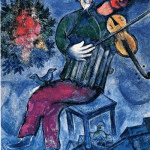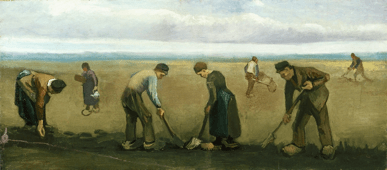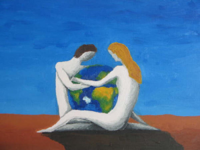In this period of alignment in Aries between Uranus-Earth-Mercury and Sun, we wish to explore together the term “man”, the meaning of which may seem common knowledge, but which has an elusive and important essence, particularly relevant in these pages concerned with identification of the principles of a new culture.
We start from the inspired words:
“Try to study the higher manifestations that are of value to humanity.
The image of mankind is created by the energy of mankind itself.“
(The Call, § 16, Agni Yoga Collection).
In the same text quoted above, in § 2, the method appears to understand the idea of Humanity as one Center:
“Try to unfold the power of insight,
That you may perceive the future unity of mankind…“.
We wonder, with courage: are we aware, as Humans, of being spiritual entities in manifestation in touch, through intuition, with the higher levels of Being? Do we feel the joy, as a fourth kingdom and fourth creative Hierarchy, of having the power to create a new image of man, and then a new cultural life on the planet?
 Among the dozens of linguistic terms used to define the Human, we know two which have developed in the Indo-European area and express, especially when combined, the essential nature of the human race:
Among the dozens of linguistic terms used to define the Human, we know two which have developed in the Indo-European area and express, especially when combined, the essential nature of the human race:
– Man, kept in the Germanic and Indo-Iranian group, derived from the root *MA-/MAN which expresses the idea of the higher mind, intuition, in which the sound M conveys the idea of the relationship between the worlds or levels of Being (the first letter of Mystery and Myth, and the final of the AUM are examplary). The term mantrika, indicating the sacred language, expresses the primary human faculty at the highest levels. The phoneme Man can also be considered as the composition of the sound M and the sound AN, which expresses the idea of the breath of life, the same as Anima, “soul”: Man is the breath of life (AN) which correlates worlds (M);
– Human, Homme, Uomo, Hombre, kept in the group of the romance area (so in French, Italian and Spanish), originates from the Latin Homo, from the root *KṢAM- that expresses the idea of earth. For example in ancient greek the spirits of the depths of the earth are called khthonioi. Homo means “earthling”.
In short, man takes us above, indicating the celestial nature, the breath of Life and the relationship between the Worlds; homo brings us below, showing the terrestrial component, the fertile ground, that complex of organic substances essential for the vitality of the kingdoms below the human. Both levels are sacred when the hierarchical relationship from higher to lower is recognized.
Even language itself thus expresses the human essence composed of Spirit and Matter, just in daily use, through the comparison between linguistic groups – which are also called “families”! This Immediately brings to mind the biblical account of Creation in Genesis, 2, 4, which conveys the idea of the divinity of human nature, created by the Lord with dust and breath of life: […] When the Lord God made the earth and the heavens, […] no plant had yet sprung up, for the … God had not sent rain on the earth and there was no one to work the ground, … For the LORD God had not yet sent rain to water the earth, and there was nobody working the ground and making water of canals rise up from the earth to irrigate the whole land – And the Lord God formed man of the dust of the ground, and breathed into his nostrils the breath of life; and man became a living soul. […]
Here we also quote an indication contained in the Agni Yoga Collection where, to name the man, a russian term is used: […] Ponder deeply upon the word “tchelovek” (man)—it denotes the thinker existing through ages. All changes of incarnations, the whole value of consciousness is expressed in one word. Can you name another language in which the incarnate dweller is named so spiritually? Other languages poorly express the idea of action. The Teacher can name a hundred words for “man” but they will be either presumptuous or inexpressive. (New Age – Community, § 32, Agni Yoga Collection).
It is not so important to analytically explore this term, but just to note it as a synonym of thinker. Let us just observe that this concept is similar to that of relying on the intuitive mind, that was first shown as a tool to perceive the future unity of mankind.
As for the idea of thought, it has been defined in other pages, in “Genesis of Ideas“, as “the realizing power of Life.”
 In hellenic antiquity planet Earth was treated as a deity, Gaia, wife of Uranus, the starry sky. The root of Gaia/Gea is *GA-, which expresses the idea of singing and rejoicing, preserved for example in Sanskrit gatha, song, and in Latin gaudium, joy. It is delightful that even this name evokes the notion of the inhabitants of the Earth as singers. This reflects the affinities between man, sound, the throat center, expressed thought, creativity and joy.
In hellenic antiquity planet Earth was treated as a deity, Gaia, wife of Uranus, the starry sky. The root of Gaia/Gea is *GA-, which expresses the idea of singing and rejoicing, preserved for example in Sanskrit gatha, song, and in Latin gaudium, joy. It is delightful that even this name evokes the notion of the inhabitants of the Earth as singers. This reflects the affinities between man, sound, the throat center, expressed thought, creativity and joy.
Human energy can really create a new image of Man redirected to the idea of Unity.







